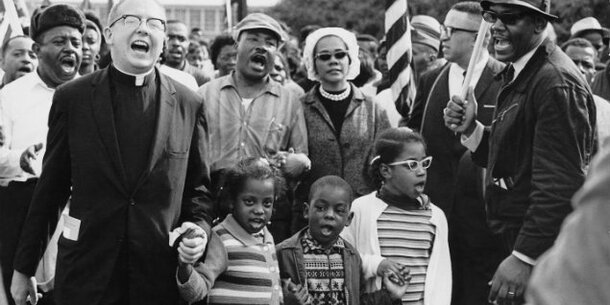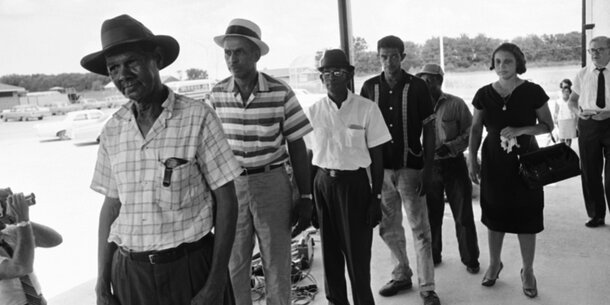You’re reading The Briefing, Michael Waldman’s weekly newsletter. Click here to receive it in your inbox.
The freedom to vote had a big moment last week. It was not about how citizens should vote in 2024, but what might happen in 2025. It was a rousing affirmation that could lead to sweeping reform — and may signal a momentous fight ahead.
The Freedom to Vote Act would guarantee early voting and vote by mail, establish automatic registration, ban gerrymandering, bring disclosure to dark money in elections, and strengthen public campaign financing and safeguards against election subversion. The John R. Lewis Voting Rights Advancement Act would restore the strength of the Voting Rights Act after it was gutted by the Supreme Court.
This package would be the most significant democracy reform in two generations. It would strike a blow for racial justice. It would strengthen our system of self-government to better represent the people of a changing, growing country. H.R. 1 and H.R. 4 came within two votes of enactment in 2022. Now it is clear that bold democracy reform is at the center of the public agenda going forward.
Last Wednesday in Chicago, the Brennan Center and Democracy SENTRY held a conversation on voting rights in 2025. Hundreds filled two rooms. We heard from Rep. Joe Morelle, the ranking member of the House Administration Committee, and Rep. Delia Ramirez of Illinois. We heard from Michigan Secretary of State Jocelyn Benson, one of the country’s foremost election officials. And we heard from top civil rights leaders Maya Wiley of the Leadership Conference on Civil and Human Rights, Damon Hewitt of the Lawyers’ Committee for Civil Rights Under Law, and Marc Morial of the National Urban League.
Senate Majority Leader Chuck Schumer keynoted. He made clear that the bills are a priority and that he hoped to pass them by February 2025, even if doing so requires changing the rules to allow their passage with a simple-majority vote. “This is vital to democracy,” he told reporters. “This is not just another extraneous issue. This is the wellspring of it all.”
Sen. Amy Klobuchar, chair of the Rules Committee, closed the event. She movingly described stepping over broken glass in the Capitol on the evening of January 6, 2021, to ensure that the electoral votes were counted. She explained that the fight over the bills, including frustration with outdated Senate rules, galvanized senators to prepare to act when they have the chance.
The Washington Post saw the significance of lawmakers’ focus on these bills, with a lead story on its website.
And the next night, Vice President Harris promised to sign the two bills.
As policy — and politics — this is a big deal.
Voters and democracy face rising attacks as Election Day approaches. We’ve seen moves to make it easier to block the verdict of voters in Georgia and other states. Defying half a century of precedent, a federal court ruled that voters can’t sue under the Voting Rights Act. Hundreds of millions of dollars from secret donors have flooded elections. As a recent Brennan Center study noted, the racial turnout gap between white and nonwhite voters in states once covered by the Voting Rights Act has grown twice as fast as in the rest of the country. This package would stop this wave of voter suppression in its tracks.
It’s also important politically.
The health of American democracy has ranked among the top issues this year in polls. We must protect against authoritarianism and a repeat of January 6. But what matters most is not what we’re against, but what we’re for: a democracy in which every eligible citizen can vote, have their vote counted, and trust the results.
Another important audience should take note of the cheers for reform: political insiders who sometimes discount public enthusiasm for democracy reform. As I told the attendees at the Brennan Center’s event, “This is not a messaging bill. It’s for real.” Remember: voting rights failed in 1957, 1960, and 1964 before being enacted in 1965.
How will this play out? We hope leaders from all parties will work to protect the freedom to vote. The last time the Voting Rights Act was considered, in 2006, it passed the Senate unanimously. In 2022, on the other hand, only one Republican senator was even willing to consider supporting the John Lewis Voting Rights Act. Sen. Ted Cruz, recognizing the broad popularity of these measures, last time called for an “under-the-dome strategy,” a euphemism for a no-holds-barred filibuster. Amid partisanship and polarization, we should not let obstruction block vital legislation.
At the Brennan Center, we’re proud that so many of the policies in these bills draw on our research and work over two decades. Here’s our commitment: if there is a chance to enact this legislation in 2025, we will do everything we can to make it happen.
As I said in Chicago, over recent years we’ve all been unnerved by the rise of the election deniers. But now there is a democracy movement — deep, diverse, and strong. If we all do our part and do it right, we can make that democracy movement the story of the coming years.






